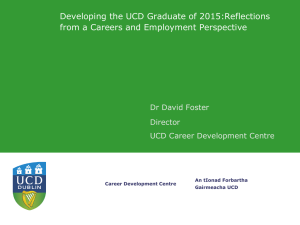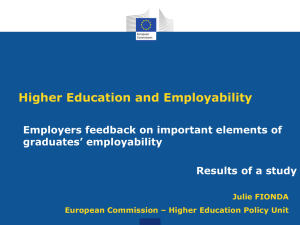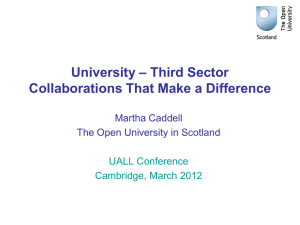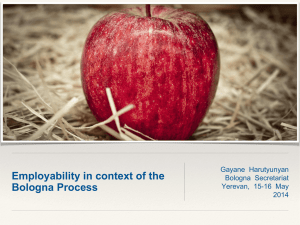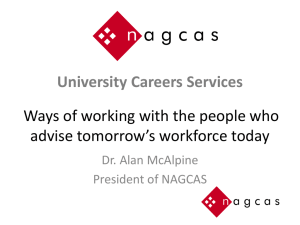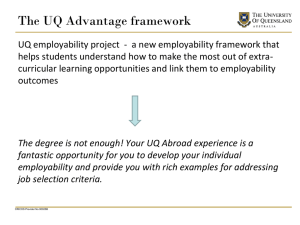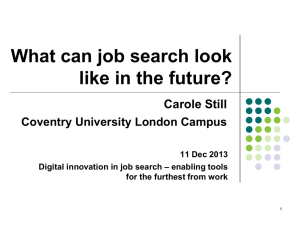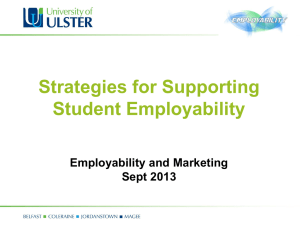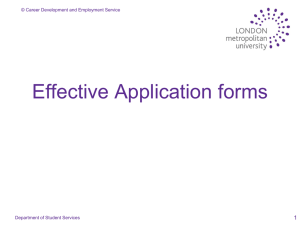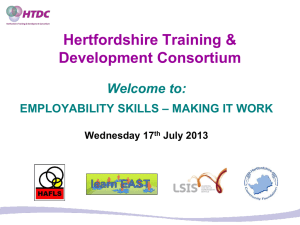Embedding employability in the student life-cycle
advertisement
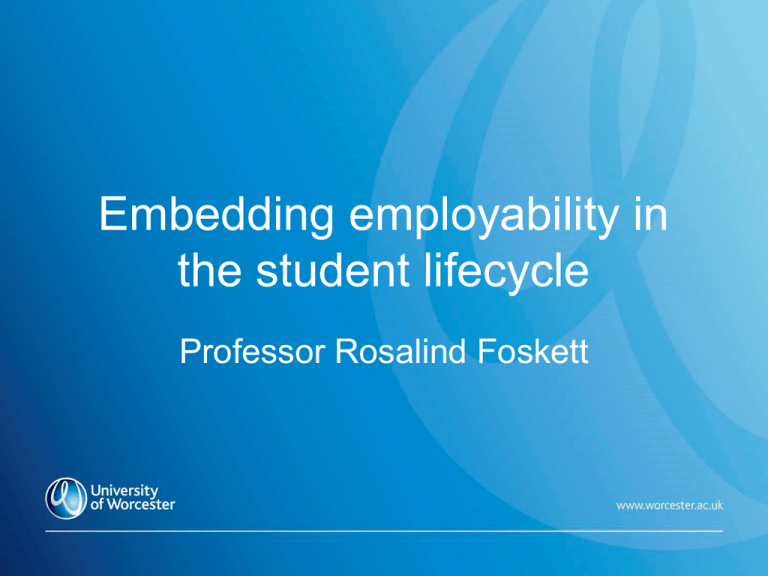
Embedding employability in the student lifecycle Professor Rosalind Foskett External drivers for change • Increasing competition for good students • Student fees and ‘value for money’ judgements • Changing patterns of student employment and unemployment • HEFCE/Research Councils emphasis on employer engagement in funding decisions • League table positions • Bologna process identifies employability as a key factor in curriculum design and university experience Internal drivers for change • Aspiration to provide top quality education for all students • LTA Strategy identifies employability as a key theme: “development of strong employability, entrepreneurial and creative skills in our graduates” • Emerging Research and Knowledge Transfer Strategy identifies links between enterprise, entrepreneurship and employability • Issues of retention and progression Graduate Prospects University Rank in league table % Graduate employment Warwick 13th 79.2 Aston 17th 78.1 Birmingham 39th 72.7 Keele 47th 70.4 Staffordshire 56th 69.0 Worcester 59th 68.2 Coventry 62nd 67.5 Birmingham City 67th 65.7 Gloucester 75th 64.2 Wolverhampton 89th 60.9 Good University Guide 2010; Times online Graduate Employability Employability skills include: • Cognitive skills - higher level intellectual or academic skills (eg interpreting, analysing, researching) • Key skills – personal skills and qualities which are generic to a range of both academic and employment settings (eg enterprise, criticality, teamwork, communication, planning and organising) • Career Management skills – skills required to manage career development (eg self analysis, networking, self reliance and reflection) • Enterprising Attitudes – personal qualities to spot opportunities and have the skills to act on them. Employability of Graduates The University, its Institutes and Services should develop mechanisms for engaging with employers to broaden their understanding of the value of our programmes and our graduates through: • Fostering and developing professional networks (eg through use of alumni, employer fora and partnership) • Engaging employers in the curriculum (eg through membership of programme development teams, validation panels and curriculum review) • Developing the knowledge of employers of the work of students and staff (eg internships, placements, project work, and knowledge transfer activity) Definition of Employability Graduate Employability Employment of Graduates Fostering Professional Networks Cognitive Skills Key Skills Career Management Skills Enterprising attitudes Employability Engaging employers in the curriculum Developing employers’ knowledge of the University An employer perspective KPMG KPMG: So what do we look for? • • • • • • • • • Business Focus Taking Responsibility Motivation and Resilience Continuous Learning Building Relationships Communicating Problem Solving Organising and delivering quality Acting with Integrity What’s on an employers wish list? • I don’t want you to train students to be accountants • 17% of our intake are accountancy and finance • I do want you to provide them with new learning opportunities and the skills to reflect on those experiences • Group projects • Live case studies • Presentation opportunities • Work experience • Exposure to employers • Preferably within the curriculum but bolt on is better than nothing A research perspective The Project The project aimed to: • map the provision of credit-bearing careers education within UK HE and FHE institutions and to produce a fine-grained typology for this provision; • identify the nature and characteristics of the provision; and • identify, through a number of vignettes, examples of interesting and innovative practice of credit-bearing careers education in higher education institutions. Typology Factors Policy frameworks Funding drivers QA/QE Devolution of political power Institutional focus Institutional type Institutional history Institutional policy Discipline autonomy Resource allocation Type of integration Disciplinary integration Optionality Personnel involved Credit-bearing careers education Type 1: Standalone, generic unit Complete free-standing unit of largely generic careers education, as part of HE programmes (e.g. A career development unit) Type 2: Integrated, generic, intra-unit provision Generic careers education integrated into programmes as part of units (e.g. PDP integrated into the programme offer) Type 3: Integrated, discipline-specific, units Provision tailored to target disciplines and integrated into programmes as an entire unit (e.g. The Professional Engineer) Credit-bearing careers education Type 4: Integrated, discipline-specific, intra-unit provision Provision tailored to target disciplines and integrated into programmes as part of a unit (e.g. Programme of career development within a discipline) Type 5: Fully integrated provision Provision fully integrated into, or mapped onto units of HE programmes (e.g. accredited WBL programme; all staff/all units/all students/all programmes embed careers education) Employability Life-cycle Website Applicant portal Personalised Careers account Freshers’ Fair Open Days Alumni Case Studies New Students Institute induction Prospective Students Clubs and Societies Seminar space Student enterprise activities Careers Advisory Service Lifetime UW membership Bespoke Institute Events Graduate Internship Business Development Office Campus Events Work-based learning Employers Alumni On-campus recruitment Subject Sell sheets Leavers’ Pack Podcasts SU activities Job Shop Interview rooms Volunteering VideoStreamed events InstituteEmployer links Careers network Existing Students EmployabilityFocused curriculum Example: Within recruitment • Does the programme publicity give details about possible employment opportunities for graduates of the course? • Does the programme publicity identify the employability skills that a student will gain from the programme? • Do you talk about employability at Open Days and recruitment events? • Do student employment profiles feature in publications or as posters within your Institute? Example: Curriculum • How has the curriculum development process been informed by employers? • Is the issue of employability addressed in the rationale for the programme? • Are the employability skills identified clearly in the module outlines and the programme specification? • Could careers education and employability skills be embedded in the curriculum and attract credit? • Have you considered including opportunities for work-related learning in your programme? • Have you considered the issue of employability in relationship to the diversity agenda Example: Alumni • What mechanisms do we have to support leavers in their transition to life post-University e.g. ‘Out’duction schemes, graduate salaried interns? • What information/support can be provided as on-going support e.g. Leavers’ packs, sell sheets, lifetime email • How do we integrate the alumni process with employability e.g. Alumni providing help ‘in kind’; relationship marketing • How do we ensure that alumni links feed into employer links for the Business Development Office? Thank you for listening
